Related Research Articles

James Francis Durante was an American comedian, actor, singer, and pianist. His distinctive gravelly speech, Lower East Side accent, comic language-butchery, jazz-influenced songs, and prominent nose helped make him one of the United States' most familiar and popular personalities of the 1920s through the 1970s. He often referred to his nose as the schnozzola, and the word became his nickname.
"Inka Dinka Doo" is a 1933 popular song whose words were written by Ben Ryan, and whose music was composed by James Francis "Jimmy" Durante.

Florence E. Moore was an American vaudeville and Broadway performer, and an actress in silent films.

Lou Holtz was an American vaudevillian, comic actor, and theatrical producer.
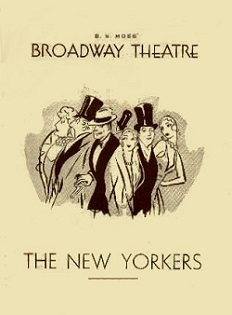
The New Yorkers is a musical written by Cole Porter and Herbert Fields (book). Star Jimmy Durante also wrote the words and music for the songs in which his character was featured.
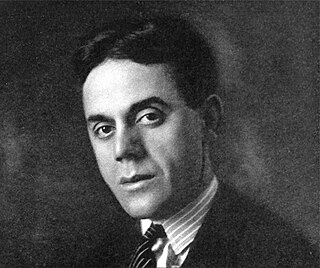
Jimmy Savo, was an American vaudeville, Broadway, nightclub, film and television performer, comedian, juggler, and mime artist.
Sammy Berk, was a vaudeville entertainer at the beginning of the 20th century. He is best known for being part of a dancing duo, Berk & Saun, with his wife, Juanita Saun.
Carnival is a 1935 American comedy film directed by Walter Lang and starring Jimmy Durante and Sally Eilers.
George Lovejoy "Doc" Rockwell was an American vaudeville performer and radio personality.
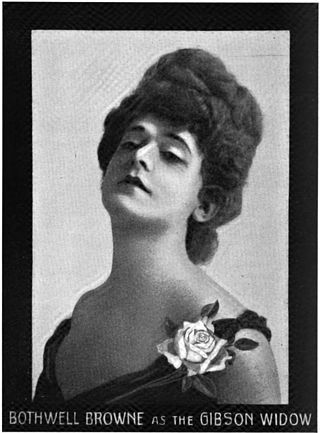
Bothwell Browne (born Walter Bothwell Bruhn; was a Danish-American stage and film performer, best known as a female impersonator.
The Vaudeville Managers Association (VMA) was a cartel of managers of American vaudeville theaters established in 1900, dominated by the Boston-based Keith-Albee chain. Soon afterwards the Western Vaudeville Managers Association (WVMA) was formed as a cartel of theater owners in Chicago and the west, dominated by the Orpheum Circuit. Although rivals, the two organizations collaborated in booking acts and dealing with the performers' union, the White Rats. By 1913 Edward Franklin Albee II had effective control over both the VMA and WVMA. In the 1920s vaudeville went into decline, unable to compete with film. In 1927 the Keith-Albee and Orpheum chains merged. The next year they became part of RKO Pictures.
William Hammerstein was an American theater manager. He ran the Victoria Theatre on what became Times Square, Manhattan, presenting very popular vaudeville shows with a wide variety of acts. He was known for "freak acts", where celebrities or people notorious for scandals appeared on stage. Hammerstein's Victoria Theatre became the most successful in New York.

Edward Jackson was a leading vaudeville performer, actor and musician, and longtime colleague and partner of Jimmy Durante. He appeared in vaudeville with Durante and Lou Clayton as the team Clayton, Jackson & Durante, known as the "Three Sawdust Bums."

Nan Halperin was a Russian immigrant to the USA who became a well-known singing comedian. She played in vaudeville at an early age, and later starred in musical comedies on Broadway such as Little Jessie James (1923).

Harland Dixon was a Canadian-American dancer and choreographer, whose career encompassed vaudeville, musical theatre, and films. For much of his career he partnered with Jimmy Doyle, as Doyle and Dixon.
Four Star Revue is an American variety/comedy program that aired on NBC from October 4, 1950, to December 26, 1953.
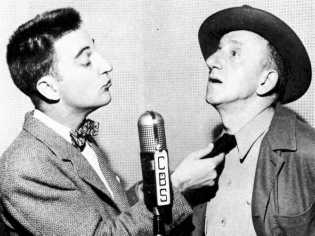
The Durante-Moore Show was an old-time radio show that ran on NBC with episodes running from March 25, 1943–October 28, 1943 and on CBS with episodes running from October 8, 1943–June 27, 1947.

Jackie Barnett PresentsOne of Those Songs is a 1966 album by Jimmy Durante, with arrangements by Ernie Freeman. The cover depicts Durante embracing CeCe, his adopted daughter with his second wife, Margie. The song "Margie" is dedicated to his wife.
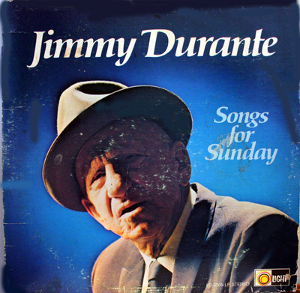
Jackie Barnett PresentsSongs for Sunday is a 1967 album by Jimmy Durante, with arrangements by Ralph Carmichael. David Bakish, in his 1995 book on Durante, described the music on the album as "truly from the heart". Durante later performed "Peace in the Valley" and "One of These Days" at the Oral Roberts summer festival in June 1971.
Plantation Revue was a 1922 revue put together by Lew Leslie, featuring some of the more popular musical numbers and comedy acts that he had hired at Harlem's Plantation Club.
References
- ↑ Vaudeville old & new: an encyclopedia of variety performances in ..., Volume 1, by Frank Cullen, Florence Hackman, Donald McNeilly, p. 341
- ↑ Palace playbill for January 24th, 1921, https://www.loc.gov/exhibits/bobhope/images/vc9.jpg
- ↑ "Lew Clayton – Broadway Cast & Staff | IBDB".
- ↑ Jimmy Durante: his show business career, with an annotated filmography and ..., by David Bakish, p. 25
- ↑ Jimmy Durante: his show business career, with an annotated filmography and ..., by David Bakish, p. 25
- ↑ Jimmy Durante: his show business career, with an annotated filmography and ..., by David Bakish, page 39
- ↑ Vaudeville old & new: an encyclopedia of variety performances in ..., Vol. 1, by Frank Cullen, Florence Hackman & Donald McNeilly, p. 341